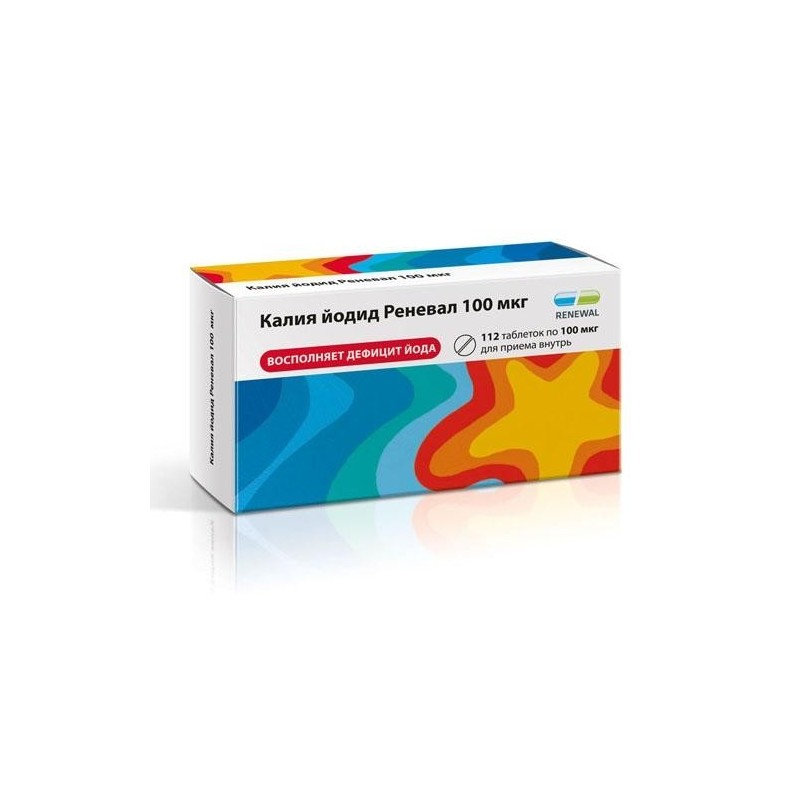



Prevention and treatment of endemic goiter. Prevention of relapse of goiter during the period of complex treatment with thyroid hormone drugs.
Prevention and treatment of endemic goiter. Prevention of relapse of goiter during the period of complex treatment with thyroid hormone drugs.
Active ingredient - potassium iodide
Potassium iodide is marketed under different brands and generic names, and comes in different dosage forms:
| Brand name | Manufacturer | Country | Dosage form |
|---|---|---|---|
| Potassium iodide | PFK Obnovlenie | Russia | pills |
| Potassium iodide pills | PFK Obnovlenie | Russia | pills |
| Potassium iodide | Obolensky OP | Russia | pills |
| Microiodide | Tatkhimpharmpreparaty | Russia | pills |
| Jodbalance | Merck KGaA | Germany | pills |
| Yodomarin | Berlin-Chemie/Menarini | Germany | pills |
No customer reviews for the moment.
When determining the required dose of the drug, it is necessary to take into account regional and individual characteristics of iodine intake from food. This is especially important when prescribing the drug to newborns and children under 4 years of age.
Prevention of iodine deficiency disorders:
Newborns and children: 50-100 mcg of iodine per day (½ − 1 tablet of the drug Potassium iodide 100 mcg);
Adolescents and adults: 100-200 mcg of iodine per day (1 tablet of potassium iodide 100 mcg or 1 tablet of potassium iodide 200 mcg);
During pregnancy and during breastfeeding: 100-200 mcg of iodine per day (1 tablet of the drug Potassium iodide 100 mcg or 1 tablet of the drug Potassium iodide 200 mcg).
Prevention of relapse of goiter after its surgical removal or after completion of the treatment of goiter with thyroid hormone drugs:
100-200 mcg of iodine daily (1 tablet of the drug Potassium iodide 100 mcg or 1 tablet of the drug Potassium iodide 200 mcg).
Treatment of euthyroid goiter
Newborns and children: 100-200 mcg of iodine per day (1 tablet of potassium iodide 100 mcg or 1 tablet of potassium iodide 200 mcg);
Teens and young adult patients: 200 mcg iodine per day (2 pills of the drug Potassium iodide 100 mcg or 1 tablet of the drug Potassium iodide 200 mcg).
The daily dose of the drug should be taken in one step, after eating, with a sufficient amount of liquid. When prescribing the drug to newborns and children up to 3 years old, it is recommended to dissolve the tablet in a small amount (1 tablespoon) of boiled water at room temperature.
The use of the drug for prophylactic purposes is carried out for, as a rule, several months or years, and often during the whole life. For the treatment of goiter in newborns in most cases 2-4 weeks is enough; children, adolescents and adults usually need 6-12 months or more. The duration of treatment is determined by the doctor.
Allergic reactions are rare: skin rash, angioedema.
Potassium iodide should not be taken with hypothyroidism, unless the development of the latter is caused by a pronounced iodine deficiency.
Administration of the drug should be avoided with radioactive iodine therapy, in the presence or suspicion of thyroid cancer.
Since the drug contains lactose monohydrate, it is not recommended for patients with rare hereditary diseases associated with galactose intolerance, lactase deficiency or glucose-galactose malabsorption.
With simultaneous high-dose therapy with iodine and potassium-sparing diuretics, hyperkalemia may develop, with lithium preparations - the development of goiter and hypothyroidism. Perchlorate and thiocyanate competitively inhibit iodine uptake by the thyroid gland, and TSH stimulates.
Antithyroid drugs weaken the effect (mutually).
In pregnancy, use is possible only in recommended doses, because iodine penetrates the placental barrier and can cause the development of hypothyroidism and goiter in the fetus.
Iodine is excreted in breast milk. When used in the mother during lactation (breastfeeding) in doses of more than 1 mg / day, there is a risk of developing hypothyroidism in the infant.
During therapy, patients with renal insufficiency may develop hyperkalemia.
With the appointment of the drug in a dose of more than 150 mg per day for patients with foci in the thyroid gland with functional autonomy, the development of iodine-induced hyperthyroidism is possible.
During therapy with high doses of iodine (more than 1,000 mcg per day), iodine-induced goiter and hypothyroidism may develop in some cases.
Chronic overdose can lead to the phenomenon of “iodism”: metallic taste in the mouth, swelling and inflammation of mucous membranes (rhinitis, conjunctivitis, gastroenteritis, bronchitis), acne, dermatitis, swelling of the salivary glands, fever, irritability.
Treatment: in case of chronic overdose, it is recommended to stop using the drug.With the development of iodine-induced hyperthyroidism, it is recommended to discontinue use of the drug and prescribe therapy with anti-thyroid agents. In severe cases, it is necessary to conduct intensive therapy, plasmapheresis or thyroidectomy.
With the development of hypothyroidism, it is recommended to discontinue the use of the drug and prescribe therapy with iodine-containing thyroid hormones.
Studies and clinical trials of Potassium iodide (Click to expand)